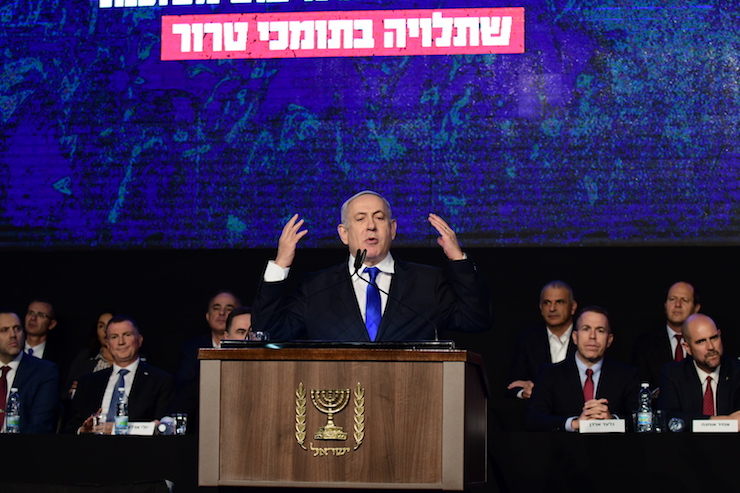The prime minister organized an emergency Likud gathering Sunday night, in which he accused Israel’s Arab citizens of supporting terror and wanting to destroy the State of Israel. We know how this kind of thing can end.

Prime Minister Benjamin Netanyahu, in a bitter struggle to prevent his challenger from establishing a government with support from the Arab-led Joint List party, has again accused Arab party leaders of representing an existential threat to Israel. On Sunday night, Joint List Chairman Ayman Odeh responded by circulating a photo on social media of himself in pajamas, reading stories to his three doting kids. “At the end of a long day, I’ve got to put these existential threats to sleep!” he wrote, to viral delight.
While it is satisfying to see Odeh eviscerate Netanyahu with humor, the prime minister’s words pose grave danger in themselves.
Netanyahu’s frenzied anti-Arab diatribes are accelerating in pace and severity. In 2015 he warned that Arab citizens were voting “in droves.” Prior to the September election, his Facebook page stated that “Arab politicians want to destroy us all.” (Netanyahu said it was a campaign staffer’s mistake.)
On Sunday, Netanyahu held an “emergency” meeting of Likud members (the emergency was not a rain of rockets but the possibility of a minority coalition backed by the Joint List). There he thundered that the rival Blue and White party was negotiating with the Arab MKs, who, he insisted, “support terror organizations and want to destroy the state.”
Unable to locate evidence that the Joint List leadership, made up of longtime politicians and civil society activists, have either the inclination or the means to destroy Israel, he instead quoted Ayatollah Khamenei of Iran, who recently called for the destruction of Israel. These are execrable words, but they fail to turn the Ayatollah into an Arab politician in Israel.
More worrying, conflating Iran’s “existential threat” with Arab-Palestinian citizens of Israel mimics the ideological rhetoric behind some of the worst ethnic violence in the world.
A close look at the origins of these atrocities shows that perpetrators held warped images of imminent destruction, which led them to commit extreme violence against a collective other, justified as national defense. Leaders and elites often fused genuine historical collective trauma with any current political challenge or injury, as proof of impending annihilation.
In the early 1990s, Serb militants didn’t wake up one morning and decide to terrorize, rape, and commit genocide against their non-Serb neighbors. Though the collapse of Yugoslavia of course involved violence from several sides, for several years Serb leaders and intellectuals had driven home the idea that Serb minorities in the former republics within Yugoslavia were facing “ethnic extinction,” according to Stuart Kaufman, a scholar of ethnic conflict. Leading academics published a memorandum stating that in Kosovo, locals were conspiring to commit genocide of the Serb population there. Albanian nationalism in Kosovo was in fact rising and many clamored for independence, like in the other republics.
The influential document insisted that Serbs had never been in more immediate danger since the Ustashe years, when the Croatian Nazi puppet regime brutalized and massacred roughly half a million Serbs. Serbs would spread rumors of rape by Albanians and Croatian organ harvesting of fallen Serb fighters. Slobodan Milosevic himself treated Kosovar Albanians as plotting “demographic genocide.” Ultimately, Bosnian Serbs were the ones convicted of genocide.

In 1994, Rwanda’s Hutu-dominated regime mobilized mass participation in a genocide against the Tutsi minority that killed roughly 800,000 people in about 100 days. The role of propaganda and incitement through the media is well-documented. But what did the incitement actually say? A Human Rights Watch report observed the following message:
Tutsi posed a danger to Hutu, who were always the victims, whether of Tutsi military power or of Tutsi cunning (use of their women to seduce Hutu, use of their money to buy Hutu), and so Hutu had a right and a duty to defend themselves.
The Human Rights Watch report continues, “It was particularly the last idea—that Hutu were threatened and had to defend themselves—that proved most successful in mobilizing attacks on Tutsi from 1990 through the 1994 genocide.”
Here, too, the current threat was pinned to recent and historic collective Hutu suffering at the hands of Tutsis. In neighboring Burundi, the Hutu had lived under Tutsi rule for decades. When the first Hutu-led government came to power in 1993, the leader was assassinated by a Tutsi coup and the reciprocal violence killed hundreds of thousands. The destruction could be seen as continuous with historic domination by a Tutsi-led monarch in Rwanda under colonialism, before a coup in 1959.
The conflation of genuine grievances with obsessive repetition of imminent existential threat should terrify everyone.
In a way, Netanyahu’s fantasies are even more egregious. They lack any basis of actual injury by Arab-Palestinian citizens of Israel, historical or present. This group is never involved in organizational terror, and individual incidents are exceedingly rare. The community has no secessionist tendencies, has participated in the Israeli political process for decades, and repeatedly states its desire for greater political, civil, and economic integration. The one demand that challenges Israeli Jews is symbolic: preservation of their battered Palestinian identity. The great political demand associated with that identity is their call to release Palestinians in the territories from a five-decade military occupation and allow their independence.
Turning Palestinian-Arab citizens into an existential threat of real destruction is a fabrication at the level of a blood libel. That’s something Jews should understand.



